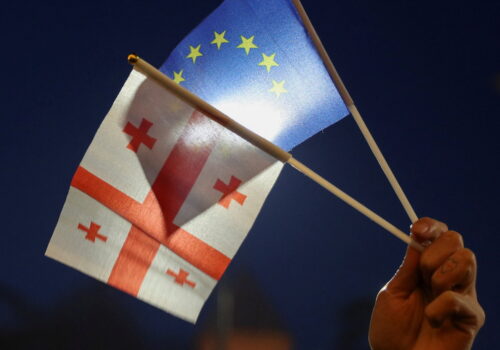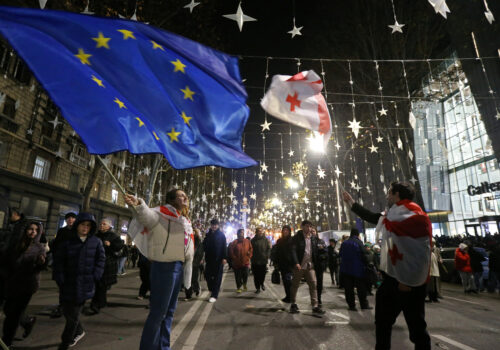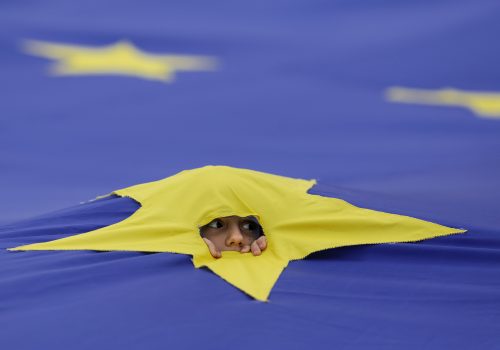Dispatch from Tbilisi: Amid Georgia’s battle for democracy, Russian influence is already here
Amid a sea of Georgian and European Union (EU) flags, there’s a palpable sense of leaderless, organic mobilization on the streets of Georgia. For more than two weeks, a growing number of Georgians have been rallying to defend what they view as their “European future.” These peaceful demonstrations were met with severe responses from the government, including the use of pepper spray, tear gas, water cannons, and rubber bullets. Yet, each day, protesters have returned, now prepared with gas masks and other protective equipment. Some bring food and water. Others carry medical kits to aid the injured. The community spirit shines through.
The protests have spilled from the grounds of the Georgian Parliament into the streets, effectively paralyzing major roads and central spaces. Even drivers of both private and public transport seem unfazed by the disruptions, often parking their vehicles to join the crowds. Georgia has confounded prior assessments of division and polarization. Currently, the only significant division in the country is between the will of the majority of Georgians and Georgia’s ruling party.
This marks the first time in Georgia’s history that the governing political party has declared a shift in the nation’s Euro-Atlantic foreign policy alignment. Last month, the ruling Georgian Dream party revived efforts to pass a “foreign agent” law, mirroring the one Russia implemented in 2012. Due to its resemblance, many in Georgia have dubbed it the “Russian law.” The proposed legislation mandates that media and civil society organizations that receive more than 20 percent of their funding from foreign sources must register as carriers of “the interests of a foreign power.” The current iteration of the bill includes fines for noncompliance. Many within and outside of Georgia fear that, akin to its Russian counterpart, this law could be used to quell dissent and hinder Georgia’s aspirations to join Euro-Atlantic institutions. Despite extensive domestic and international criticism, the bill recently passed its second reading in parliament with support from the Georgian Dream and its allies.
The stakes are now higher than ever. In his April 29 speech, Ivanishvili announced plans for a Soviet-style crackdown on critics.
The bill encapsulates the broader ambitions of the Georgian Dream party. Before the second reading, the party’s founder and leader, Bidzina Ivanishvili, delivered a national address. Various reports document Ivanishvili’s connections with Russia. In his speech, he confirmed what many observers have suspected about the party’s intentions, beginning with its 2012 rise to power and increasing in recent years: It is pivoting Georgia’s foreign policy, potentially leading to the abandonment of the country’s NATO and EU aspirations.
Although Ivanishvili did not reveal any new information in his Monday speech, it signified a pivotal moment for Georgia, as he openly designated the West as an external adversary and described Georgia’s civil society as an internal one. “The funding of NGOs, which they often begrudge us and count as aid, is used almost exclusively to strengthen the agents,” he said. Labeling almost any dissenting voice as part of a Western spy network, Ivanishvili asserted that Western powers are plotting to overthrow the government and want to “turn Georgia into a second front” with Russia. Ivanishvili endorsed the need for a Russian-style foreign agents law aimed at political repression and curtailing free media—measures that will likely further alienate Georgia from the West.
This shift stands in stark contrast to the desires of more than 80 percent of Georgians who aspire to join the EU and more than 70 percent who wish to join NATO. Moreover, this shift breaches the Georgian constitution, particularly Article 78, which mandates that constitutional bodies undertake all necessary measures to ensure Georgia’s full integration into the EU and NATO.
Despite the increasing scale and duration of the protests compared to last year, Ivanishvili made a distinct point in his speech of differentiating himself from Viktor Yanukovych, Ukraine’s former pro-Russian president. He issued a stern warning against any attempts to challenge him in the same manner as Ukrainians did with Yanukovych, when protesters successfully defended their European aspirations and ousted a pro-Russian government.
While Georgia’s Western partners have raised alarms about the developments in the country, Moscow defended Georgian Dream’s actions. On April 4, Kremlin spokesperson Dmitry Peskov claimed that it’s “normal” that Georgia does not want to see “interference from other countries in domestic politics.” Later in April, Russian Security Council Deputy Chairman Dmitry Medvedev labeled the protests as Western-staged and supported the bill in the name of “transparency.”
This backing did not come as a surprise amid Georgia’s gradual withdrawal from the West and rapprochement with Russia in the last few years. Following Russia’s full-scale invasion of Ukraine, Georgia has taken several foreign policy steps that indicated a significant opening toward Russia. Since Georgia opted not to participate in Western sanctions against Moscow, Russia has become one of its primary trading partners. Additionally, Georgia has facilitated the relocation of a considerable number of Russian businesses to its territory, with thousands of Russian companies registering in Georgia since the invasion. There are various reports suggesting that some elements within Georgia are helping Russia circumvent Western sanctions. The relationship further thawed as Moscow and Tbilisi resumed direct flights and Russia lifted visa restrictions for Georgian citizens that had been imposed since the early 2000s. Furthermore, in March 2022, Russia revised its list of “unfriendly countries,” removing Georgia from the list.
The growth of Russian influence and expected subsequent pull of Georgia into Moscow’s orbit could have significant repercussions.
Over the past few years, both the Georgian and Russian governments have orchestrated various influence efforts aimed at paving the way for Georgia’s rapprochement with Russia and preparing Georgian society for this foreign policy shift. Kremlin and Georgian Dream officials have engaged in efforts to demonize the West and discredit Georgia’s pro-Western civil society. Both governments have utilized fear of Russia as a tool for blackmail; Russia has employed covert operations through state-controlled propaganda platforms to undermine Georgia’s political opposition and bolster support for Georgian Dream.
Despite various stage-setting influence efforts and policy moves, massive protests continue across Georgia, demonstrating the population’s strong commitment to defending their freedoms and democratic values. The stakes are now higher than ever. In his April 29 speech, Ivanishvili announced plans for a Soviet-style crackdown on critics, signaling a grave turn for those striving to build a liberal democracy and a Euro-Atlantic future in Georgia. They might soon face a stark choice: Either conform and remain silent or leave the country. Those who fail to comply with the new directives may face severe administrative and criminal charges, according to the long-time and well-tested authoritarian playbook.
Recent developments necessitate an immediate policy response from the West regarding Georgia. The growth of Russian influence and expected subsequent pull of Georgia into Moscow’s orbit could have significant repercussions, not only for Georgia but also for the broader region and the Euro-Atlantic alliance. The West has criticized Georgian Dream’s actions and expressed support for the Georgian people. Now, the West must take action to help defend democracy and the rule of law in Georgia.
The Georgian people, who have repeatedly received assurances of support from the West, are now awaiting a definitive indication that the West truly stands with them and for democracy. This desire for a clear signal reflects their expectations for tangible backing in their pursuit of freedom, democratic values, and Euro-Atlantic integration.
Eto Buziashvili is a research associate focusing on Eastern Europe and Russia at the Atlantic Council’s Digital Forensic Research Lab (DFRLab).
Further reading
Tue, Apr 9, 2024
Georgia launches new push to adopt Russian-style foreign agent law
UkraineAlert By Mercedes Sapuppo
Georgia’s ruling party has revived plans to pass legislation tightening restrictions on civil society, despite the fact that the same draft law sparked mass protests just one year ago, writes Mercedes Sapuppo.
Thu, Jan 4, 2024
With Russia focused on Ukraine, Georgia should forge ahead boldly with its Euro-Atlantic ambitions
New Atlanticist By
Georgian officials should recognize the present opportunity to advance stronger ties with Europe and the United States, especially ahead of Georgian elections this year.
Fri, Jun 30, 2023
The next European Union member is…
New Atlanticist By
Ten years after Croatia joined the bloc—the last country to do so—Atlantic Council experts look at eleven countries that might join next.
Image: People take part in a protest against a bill on "foreign agents" in Tbilisi, Georgia April 28, 2024. REUTERS/Irakli Gedenidze


